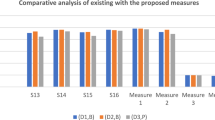Abstract
Describing protein structures in terms of their energy features can be a key to understand how proteins work and interact to each other in cellular reactions. This can be also a base to compare proteins and search protein similarities. In the paper, we present protein comparison by the alignment of protein energy signatures. In the alignment, components of energy signatures are represented as fuzzy numbers. This modification increases the sensitivity of the alignment and guarantees the approximate character of the method, at the same time. The effectiveness of the developed alignment algorithm is tested by incorporating it in the new FS-EAST method (Fuzzy Signatures - Energy Alignment Search Tool), which allows to seek similar structural regions of proteins.
Scientific research supported by the Ministry of Science and Higher Education, Poland in years 2008-2010.
Preview
Unable to display preview. Download preview PDF.
Similar content being viewed by others
References
Gibas, C., Jambeck, P.: Developing Bioinformatics Computer Skills. O’Reilly, Sebastopol (2001)
Allen, J.P.: Biophysical Chemistry. Wiley-Blackwell, Chichester (2008)
Mrozek, D., et al.: Energy Profiles in Detection of Protein Structure Modifications. In: IEEE Conference on Computing and Informatics, Kuala Lumpur, pp. 1–6 (2006)
Małysiak, B., et al.: Signal Transduction Simulation in Nanoprocesses Using Distributed Database Environment. In: MSO 2005, pp. 17–22. ACTA Press (2005)
Lodish, H., Berk, A., Zipursky, S.L., et al.: Molecular Cell Biology, 4th edn. W. H. Freeman and Company, NY (2001)
Mrozek, D., Małysiak, B.: Searching for Strong Structural Protein Similarities with EAST. CAMES 14, 681–693 (2007)
Małysiak, B., Momot, A., Kozielski, S., Mrozek, D.: On Using Energy Signatures in Protein Structure Similarity Searching. In: Rutkowski, L., et al. (eds.) ICAISC 2008. LNCS (LNAI), vol. 5097, pp. 939–950. Springer, Heidelberg (2008)
Gibrat, J.F., Madej, T., Bryant, S.H.: Surprising Similarities in Structure Comparison. Curr. Opin. Struct. Biol. 6(3), 377–385 (1996)
Holm, L., Kaariainen, S., Rosenstrom, P., Schenkel, A.: Searching protein structure databases with DaliLite v.3. Bioinformatics 24, 2780–2781 (2008)
Shindyalov, I.N., Bourne, P.E.: Protein structure alignment by incremental combinatorial extension (CE) of the optimal path. Protein Eng. 11(9), 739–747 (1998)
Krasnogor, N., Pelta, D.A.: Measuring the similarity of protein structures by means of the universal similarity metric. Bioinformatics 20(7), 1015–1021 (2004)
Friedberg, I., Harder, T., Kolodny, R., et al.: Using an alignment of fragment strings for comparing protein structures. Bioinformatics 23(2), 219–224 (2007)
Rodrigo, J., Barbany, M., et al.: Comparison of Biomolecules on the Basis of Molecular Interaction Potentials. J. Braz. Chem. Soc. 13(6), 795–799 (2002)
Ji, H., Li, H., Flinspach, M., Poulos, T.L., Silverman, R.B.: Computer Modeling of Selective Regions in the Active Site of Nitric Oxide Synthases: Implication for the Design of Isoform-Selective Inhibitors. J. Med. Chem., 5700–5711 (2003)
Leach, A.R.: Molecular Modelling. Principles and Applications, 2nd edn. Pearson Education Ltd., London (2001)
Cornell, W.D., Cieplak, P., et al.: A Second Generation Force Field for the Simulation of Proteins, Nucleic Acids, and Organic Molecules. J. Am. Chem. Soc. 117, 5179–5197 (1995)
Berman, H.M., Westbrook, J., et al.: The Protein Data Bank. Nucleic Acids Res 28, 235–242 (2000)
Ponder, J.: TINKER - Software Tools for Molecular Design, Dept. of Biochemistry & Molecular Biophysics, Washington University, School of Medicine, St. Louis (2001)
Jian-Kui, G., Qing, W., Zhenhua, H., et al.: Estimating Similarity Over Data Streams Based on Dynamic Time Warping. In: Proc. of 4th Conference Fuzzy Systems and Knowledge Discovery, 2007, pp. 53–57. IEEE Computer Society, Los Alamitos (2007)
Needleman, S.B., Wunsch, C.D.: A general method applicable to the search for similarities in the amino acid sequence of two proteins. J. Mol. Biol. 48(3), 443–453 (1970)
Smith, T.F., Waterman, M.S.: Identification of Common Molecular Subsequences. Journal of Molecular Biology 147, 195–197 (1981)
Altschul, S.F., Gish, W., Miller, W., Myers, E.W., Lipman, D.J.: Basic local alignment search tool. J. Mol. Biol. 215, 403–410 (1990)
Heger, A., et al.: The global trace graph, a novel paradigm for searching protein sequence databases. Bioinformatics 23, 2361–2367 (2007)
Author information
Authors and Affiliations
Editor information
Editors and Affiliations
Rights and permissions
Copyright information
© 2009 Springer-Verlag Berlin Heidelberg
About this paper
Cite this paper
Mrozek, D., Małysiak-Mrozek, B., Kozielski, S. (2009). Protein Comparison by the Alignment of Fuzzy Energy Signatures. In: Wen, P., Li, Y., Polkowski, L., Yao, Y., Tsumoto, S., Wang, G. (eds) Rough Sets and Knowledge Technology. RSKT 2009. Lecture Notes in Computer Science(), vol 5589. Springer, Berlin, Heidelberg. https://doi.org/10.1007/978-3-642-02962-2_36
Download citation
DOI: https://doi.org/10.1007/978-3-642-02962-2_36
Publisher Name: Springer, Berlin, Heidelberg
Print ISBN: 978-3-642-02961-5
Online ISBN: 978-3-642-02962-2
eBook Packages: Computer ScienceComputer Science (R0)




